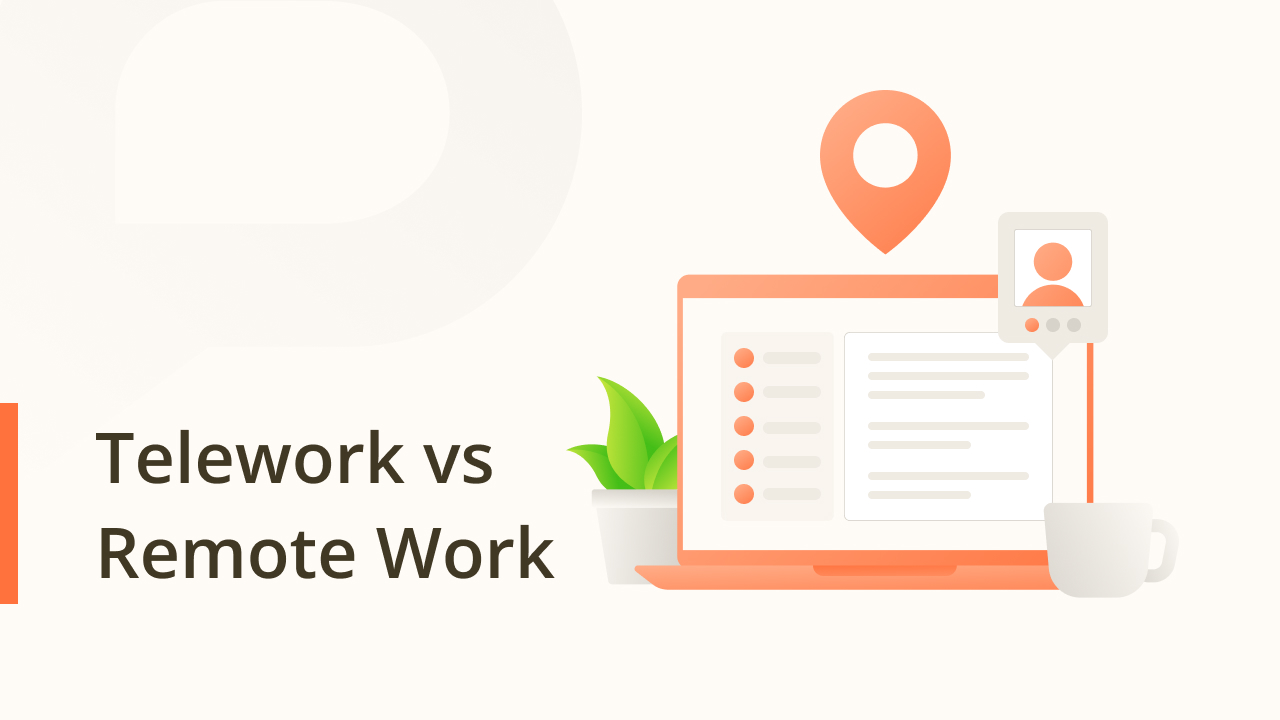Spending too much on recruitment, payroll or global HR?
We help you find the Best Providers at the lowest cost.
Key Points
Remote work and telework are attractive to both employers and employees because of their potential to reduce overhead and add flexibility.
For employers, the choice of telework vs remote work depends on their product, market niche, company culture, and the positions they are hiring for.
For employees, the choice of telework vs remote work depends on career goals, specialization, and lifestyle choices.
The decision between telework or remote work doesn’t have to be a zero-sum game. Employers may choose a mix of both based on their needs and priorities.
New technologies and changes in the global economy bring constant disruptions and opportunities to both employees and employers. The Information Age has created many new markets and industries, but it has also changed the nature of work itself. In this article, we take a look at some of the biggest trends in the world of work as we compare and contrast telework and remote work.
Broadly speaking, teleworking and remote work both refer to work that is done primarily outside of a ‘bricks-and-mortar’ office. Whether telework or remote work is the best option for any one employee or organization really depends on their specific needs and work or career direction.
What does remote work mean?
Remote workers and their employers could potentially be based anywhere in the world. Some offices may hire mainly in-person employees, and only use remote freelancers or contractors. On the other end of the spectrum, the entire office could be remote, meaning that the company does not have a permanent physical space and every employee works remotely.
Remote work is often conducted asynchronously. This means that team members are not meeting in real-time, but are instead communicating through messaging systems and collaborating via software. Working asynchronously allows teams to be based in different time zones; components of a project may be done at different times within a given 24-hour period, following the remote teammates’ own schedules and time zones.
What does telework mean?
Teleworkers may work at home most of the time, however, they often attend meetings and events in person. They may be required to be physically present in the office for a certain number of hours or days each week, as well. Telework jobs are sometimes classified as “hybrid”, meaning they may be fulfilled partially remotely, but require some time in the physical office.
Telework generally entails synchronous work hours. Though the worker is not physically present in the office at all times, they are required to work during the same hours as other employees. An example of teleworking may be a sales agent who generally makes their own schedule, however, they are required to check in each morning, report to their managers throughout the day, and attend weekly sales team meetings in person.
While similar to telecommuting, the term ‘telecommuting’ is often used for occasional work from outside the office, whereas ‘telework’ implies an ongoing work style.
While, anecdotally, many employees report improved wellness due to remote work or telework, there is still a need for further research on whether, overall, ‘out-of-office’ arrangements are better for employee health. The research that is available suggests that both remote workers and teleworkers would benefit from clear guidelines remote work and telework guidelines within the workplace.
Telework vs remote work: The key differences
Both teleworkers and remote workers work from home, a co-working space, or some other space that is not their employers’ physical office. Both rely heavily on cloud-based enterprise software, shared online documents and workspaces, instant messaging, and phone and video calls in order to communicate with their fellow team members. From there, however, there are some major differences:
Telework vs. Remote Compared
| Telework | Remote Work |
|---|---|
| Work is done outside the physical office. | Work is done outside the physical office. |
| Rely on shared online documents and workspaces, instant messaging, and phone and video calls in order to communicate with their fellow team members | Rely on shared online documents and workspaces, instant messaging, and phone and video calls in order to communicate with their fellow team members |
| Remote work can be entirely virtual. | Teleworkers are often required to available in-person at times. |
| Remote teams can be dispersed throughout the globe. | Telework teams must reside in the same geographic area. |
| Asynchronous: Remote workers generally make their own hours, however they must be available for scheduled video calls and complete assignments on schedule. | Synchronous: Teleworkers start and finish their workday at the same time as those in the home office. |
Telework or remote work? Our final thoughts
For an employee, the choice between telework or remote work largely depends on their preferred lifestyle and career goals. For employers, the choice between telework or remote work will depend more on their business niche and workforce requirements.
Remote work is well suited to employees who wish to relocate around the country or the world. It may also be chosen because a partner has accepted a job that requires relocation. Remote work is a popular choice for content producers, digital marketers, programmers, designers, and others who spend most of their time working independently on digital projects.
Telework may be chosen by employees who want to continue along their career track within the same company, but want more flexibility in their schedule. Telework is common for sales and marketing teams, customer service representatives, accounting, and researchers.
Employers may choose to hire remote workers or teleworkers largely based on which model works best for the positions being filled. The decision will also depend on industry, business niche or focus, and company culture.
Businesses with a product or service that caters to a specific region may prefer teleworkers based in that region. A company culture that emphasizes team-building, relationship-building, or group-selling may also prefer telework in order to increase face-time between team members and clients.
Companies selling digital products to a global market, businesses that rely on freelancers and contractors, and those that wish to take advantage of salary differences and labor pools in different regions may prefer remote teams.
Many offices develop a mixed workplace consisting of some office-based employees, some teleworkers in the same region, and some remote workers based around the globe. Due to the flexibility and advantages offered by telework and remote work, both will undoubtedly continue to grow and be major features of the modern workplace for some time to come.
FAQ
Your office should implement telework, remote work, or both when there is a clear advantage to doing so. Remote work for some positions could lead to cost savings and quickly grow new capabilities for the organization. Telework could attract candidates, help maintain in-person contact between team members, and reduce overhead costs in comparison with traditional employees.
procedures.
Telework and remote work have many similarities but are not the same. Teleworkers are required to be physically present occasionally and work during the same hours as in-office employees. Remote workers can be entirely virtual, working in any timezone.


